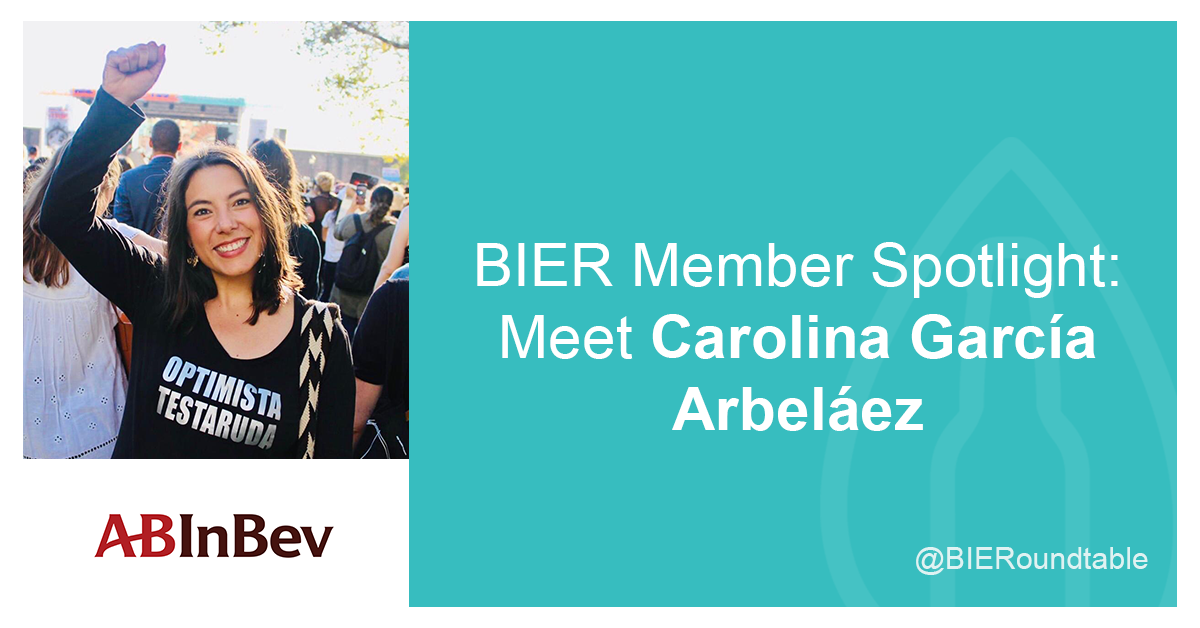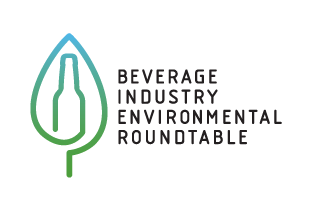BIER Member Spotlight: Carolina García Arbeláez
Meet Carolina García Arbeláez

BIER Memeber Spotlight: Carolina García Arbeláez
Name: Carolina García Arbeláez
Company: AB InBev
Connect with Karen on LinkedIn and Twitter
Welcome to our series aimed at spotlighting the individual leaders within BIER member companies and stakeholder organizations. Learn how these practitioners and their companies are addressing pressing challenges around water, energy, agriculture, climate change, and what inspires each of them to advance environmental sustainability in the beverage sector and collectively, overall.
Briefly describe your role and responsibilities and how long you have worked with your company.
I'm the sustainability manager for the Middle America zone of AB InBev which covers more than 10 countries including Mexico, Central America, the Caribbean, Colombia, Peru, and Ecuador.
I've been with AB InBev for over three years and interestingly, this is my first experience in the private sector. Previously, I worked for the World Wildlife Fund for Nature (WWF). I've always been focused on sustainability and I am a lawyer by background. I joined the private sector because I felt that the private sector was one of the most important factors of the economy. With approximately 70% of the world's GDP and 70% of the world's global employment, changing corporate DNA towards a sustainable one is vital. For example, if corporate DNA were not to change to a sustainable one, it just seems impossible to address global challenges such as climate change. The private sector plays a very important role.
With that in mind, I joined AB InBev and the opportunity to help drive sustainability into a leading global company. As in, making it our business. When we launched the Global Sustainability Goals, we said loud and clear that sustainability was not part of our business, that it was our business. This has a huge meaning in terms of implementation because it actually means embedding sustainability within the core business. As such, we have a plan and we have goals. The role of the sustainability team is actually delivering on those goals.
One goal is focused on water. We are fortunate to have Andre Fourie as our Global Director for Water Sustainability. He has been very successful in making our water goals so ambitious by focusing on the watershed health. Specifically, we committed to having a measurable, improved water availability and quality for 100% of our communities in high-stress areas.
What this means is that we do an assessment to understand the risks we're facing in each watershed. We recognize that at the end of the day, if there isn’t any water, then there isn’t any beer. We also recognize the internal constraints. Meaning, there is only so much you can do within the walls of your company. We can be as efficient as we can be and it’s important to have the best practices in the world in terms of water use, reuse, and recycling but if the watershed has stress then you have an operational risk beyond our direct control. So working with stakeholders within the broader watershed is a key element for a beverage company. And the goal is to have a measurable improvement in the impact and in the availability or in the quality of those watersheds. I think this is by far our most ambitious goal in that it requires a lot of investment and also there is a lot of uncertainty. Also, to actually prove that there is a measurable impact means you have to work with science to measure that. It requires innovation.
Additionally, I think it's a very ambitious goal in that we are aiming way beyond offsetting our operational water use, but taking the time to help address the root water stress in each of our high-risk watersheds and determine a tailor-made plan for each of them, despite the differences and complexities. This includes priority watersheds in markets such as Brazil, Argentina, Colombia, Peru, Mexico, South Africa, the US, and Zambia. To address this, we have developed a seven-step process that acts as our roadmap to address our global watershed goal and we are implementing it across the Middle Americas.
What are your impressions of BIER and what do you feel has been the group’s impact on private sector environmental sustainability?
BIER has been great in showing the scope of things that we can do collectively. It is essential for us to go beyond the walls of our own respective companies. Working with other BIER members offers the opportunity to learn from others, to share good practices, aim your scope of action, and with that, our scope of vision for opportunities increases a lot. Collaborating with others is amazing because that's the way we can actually leapfrog to be better.
As I see it, the world has so many pressures and is in need of urgent action. Because of that, it’s important to set aside competition and focus on sustainability. It’s essential that we work with each other so we can move forward together. To put it in perspective, if any one company becomes the most sustainable company in the world, but the other companies lag behind, it's useless! We are not living in our world on our own. We work in a world where everyone and everything is intertwined. These unique initiatives, like BIER, are the ones helping us create that collective vision and systemic change in order to have a better impact and to evolve faster. Getting all of the BIER members together to help us decide and agree upon what the most impactful topics and projects are, is very important. I appreciate the reciprocal relationship and knowledge sharing between the members on so many different levels.
Learn more about Carolina García Arbeláez in this BIER Member Spotlight.

